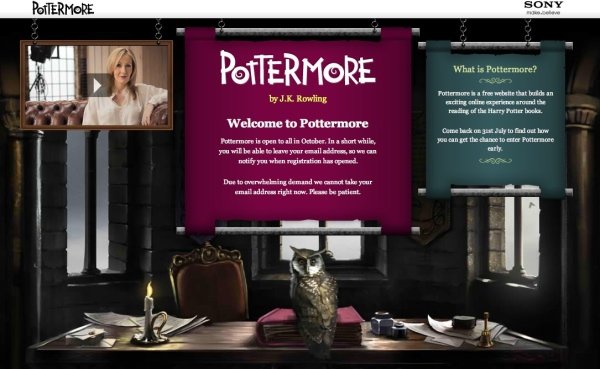That’s big news for e-books as the bestselling series will undoubtedly be wildly successful in its new e-format. (It’s as good an excuse as any to reread all the novels, right?) But the announcement is significant in a number of other key ways, not just because of Rowling’s decision to release the e-books now, but because of the way in which she has chosen to do it.

Self-Publishing’s Defining Moment
The books will be available exclusively through the Pottermore site, meaning that Rowling is self-e-publishing the novels. While self-publishing is, of course, nothing new, digital publishing and digital readership has helped self-publishing become more popular and, for authors, more lucrative. As we reported earlier this week, Amazon recently announced that self-published author John Locke had joined its “Kindle Million Club” after selling over one million copies of his e-books on the Kindle platform.
But Rowling’s decision here isn’t just another mark of legitimacy for self-publishing, nor is it simply yet another blow to the traditional publishing industry – although no doubt, both of those are true. Rowling’s announcement has several other ramifications here for the publishing industry.
DRM-Free Content
Digital rights management (DRM) technology is often placed on digital content, so the argument goes, to help prevent piracy. And indeed, the Harry Potter series may already be among the most pirated books in history, no doubt because of fans’ desire to read the books in a digital format. But rather than viewing that desire with suspicion about sharing, Rowling is trusting they’ll do the right thing. The Harry Potter e-books will reportedly be DRM-free, although they will be digitally watermarked with purchasers’ information.
Wired calls this the publishing industry’s “Radiohead moment” and likens this to the band’s release of its albums on its own site. “The crucial parallel between Radiohead and Rowling is the fact that they both put their faith in the fans rather than any intermediary. For Radiohead, this meant self-releasing their album In Rainbows after the end of their contract with EMI with an honesty-box pricing strategy.”
E-Book Standards
DRM-free content also means that consumers won’t be locked in to one particular format. As it currently stands, DRM is one mechanism that prevents users from sharing e-books; but it also means that Kindle owners can’t read Nook content, and Nook owners can’t load their iBooks onto their devices. But DRM is only part of the problem here; file formats are another. Rowling says that the books will be made available for all formats – to Kindle, iPad, Nook owners alike.
It’s not yet clear how that will be accomplished, but the most obvious way to do that would be via ePUB, the open e-book standard. However, Kindle does not currently support ePUB. But as paidContent’s Laura Hazard Owen posits, “if any author could get Amazon to change its policy, it’s J. K. Rowling.”
There have been rumors recently that the Kindle will begin supporting ePUB, and that may come as part of Amazon’s new library lending program this summer.
(Another) Tipping Point for E-Books
The tipping point for e-books could have been when Amazon announced that Kindle versions were outselling print bestsellers two-to-one or when it said that e-books were outselling all print copies. The tipping point could have been when the company announced that a self-published author had managed to sell one million copies of his e-books.
But it seems likely that with the excitement and passion that Harry Potter fans have for anything associated with the series, that the release of the digital Pottermore will unleash yet another milestone in what is a quickly changing landscape for publishing.
